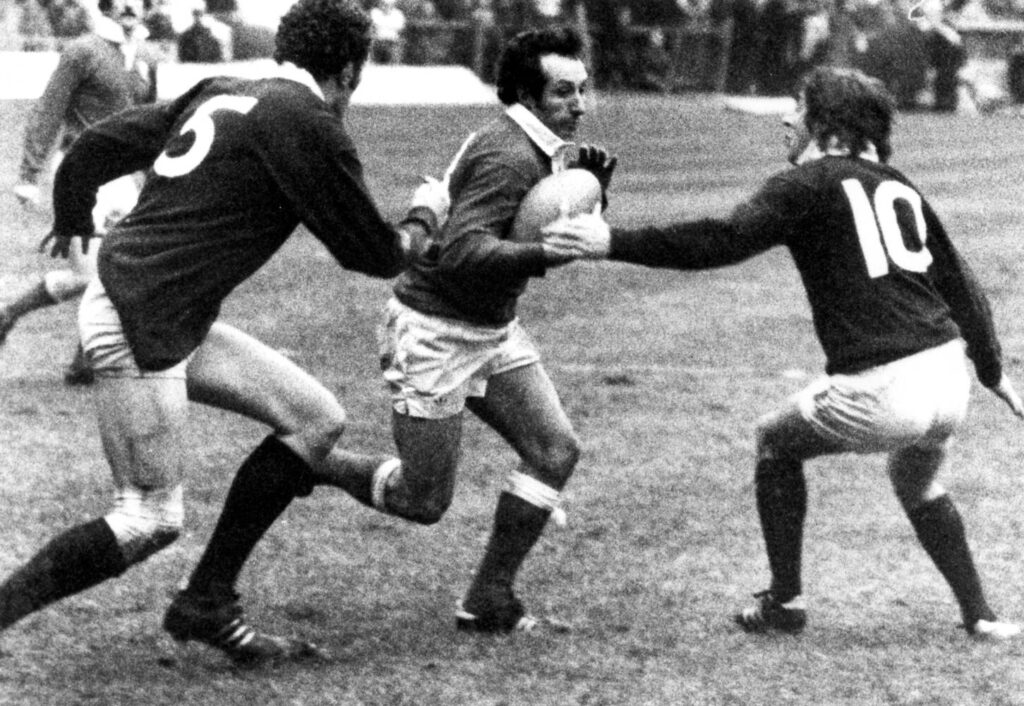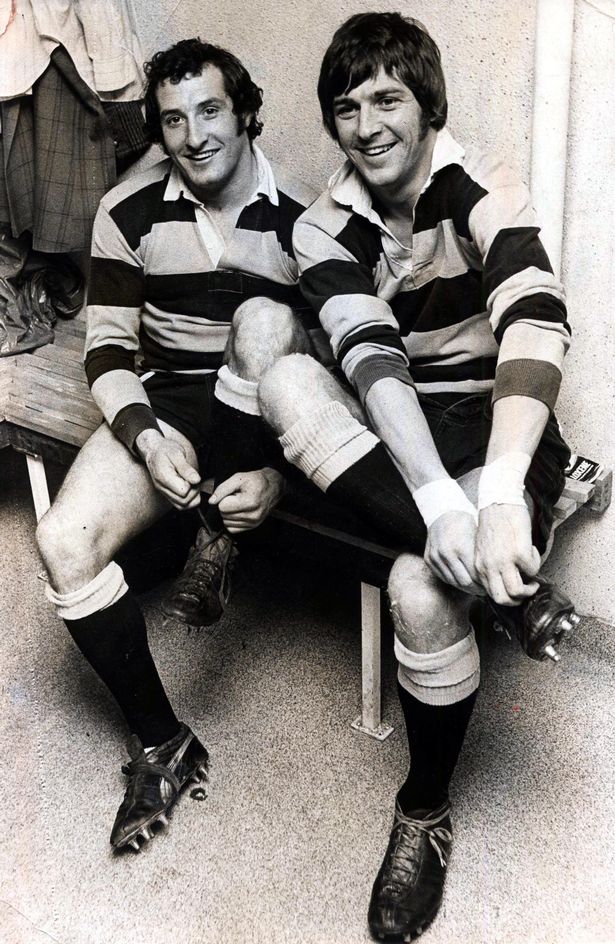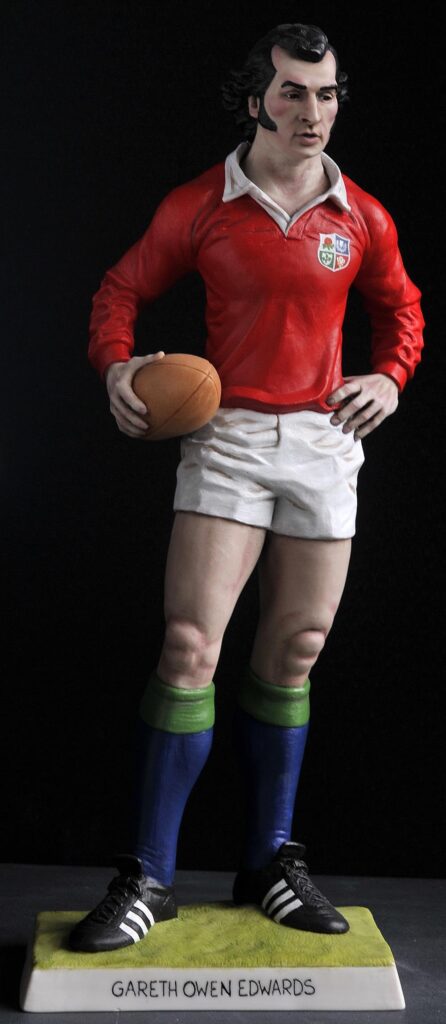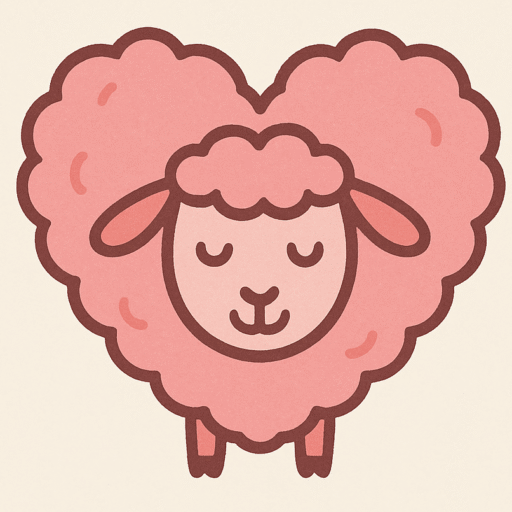Gareth Edwards

SIR Gareth Edwards, CBE (born July 12, 1947) is a Welsh former rugby union player who played scrum-half for Cardiff, Wales and the British Lions with distinction and is regarded by many as the greatest player of all time.
Edwards was prominent in the Wales national team that was to the fore in European rugby in what is often referred to a ‘golden era’ of the 1960s-70s. He is one of a small group of Welsh players to have won three Grand Slams – victorious against all opponents in the Five/Six Nations Championship – including Gerald Davies, JPR Williams, Ryan Jones, Adam Jones, Gethin Jenkins and Alun Wyn Jones.
Edwards remains the youngest player ever to captain Wales, first taking the captaincy at the age of 20 in February 1968 against Scotland – a game which Wales won 5–0.
He teamed up at half-back for Wales with two of the best outside-halves the game has ever seen – Barry John and Phil Bennett. In the early part of his career, Edwards and his Cardiff clubmate Barry John formed an outstanding half-back pairing, often seeming to have an almost telepathic understanding on the field of play.

During the Edwards era the Welsh side dominated the then Five Nations Championship, winning the title seven times, including those three invincible Grand Slam campaigns. He was voted Player of the Year in Wales in 1969.
In 2007, former England captain Will Carling published his list of the ’50 Greatest Rugby Players’ in The Daily Telegraph, and ranked Edwards the greatest player ever, stating; “He was a supreme athlete with supreme skills, the complete package. He played in the 1970s, but, if he played now, he would still be the best. He was outstanding at running, passing, kicking and reading the game. He sits astride the whole of rugby as the ultimate athlete on the pitch”.
Yet the miner’s son from Gwaun-Cae-Gurwen never let his rugby success go to his head and remained modest about his sporting prowess. He admitted that All Black scrum-half Sid Going, his great New Zealand All Blacks rival, most likely got the better of him over their seven encounters. “He was the best I played against and, yes, he probably had the edge on me in the games we played,” Edwards recalled.
Edwards played 10 times for the British and Irish Lions, playing for the 1971 Lions tourists that was the only such team to win a series in New Zealand, and for the unbeaten 1974 side in South Africa.
In 2003, in a poll of international rugby players conducted by Rugby World magazine, Edwards was declared the greatest player of all time, while the BBC was slightly more reserved in describing him as “arguably the greatest player ever to don a Welsh jersey”.
In the 2007 New Year Honours, Edwards became a CBE for services to sport.
He was knighted in the Queen’s Birthday Honours of 2015, for services to sport and for charitable services.
In his formative years, Edwards attended Pontardawe Technical School for Boys (later Cwmtawe Community School), where he was taken under the wing of sports teacher Bill Samuels.
He won a scholarship to the elite Millfield Public School in Somerset. Apart from rugby, Edwards showed promise in a wide range of sports, playing for West Wales Youth soccer team, and signing for Swansea Town at the age of 16. He also showed prowess in gymnastics and athletics.
He made his debut for Cardiff RFC against Coventry on September 17, 1966, and he played 12 seasons in all for Cardiff, scoring 69 tries in 195 games.
Edwards also played for Cardiff College, Wales Secondary Schools, East Wales, Wales, Barbarians, Wolfhounds, Irish President XV, World XV in South Africa in 1977, the combined England and Wales against Scotland and Ireland at the RFU centenary in 1971, first Wales Sevens team SRU centenary in 1973, and the RAF (though not in the Services) on tour in Cyprus in 1972.
His first international cap for Wales arrived on April 1, 1967, at the age of 19 against France in Paris. Wales lost 20–14 to eventual championship winners France.
Between 1967 and 1978 Edwards won 53 caps for Wales, including 13 as captain. All his caps were won in succession; he never had a dip in form nor an injury that would allow anybody else to take his place. He scored 20 tries in internationals.
Edwards’ try for the Barbarians against the All Blacks in 1973 at Cardiff Arms Park, often referred to simply as ‘that try’, is widely regarded as the greatest try ever. The move starts with a deep kick from the New Zealand winger. The ball dropped towards Phil Bennett near to his goal line. Bennett sidestepped and evaded three tackles, in turn passing the ball to JPR Williams. It next passed through four pairs of hands (Pullin, Dawes, David and Quinnell) before Edwards, slipping between two team-mates and seemingly intercepting the last pass, finished with a diving try in the left-hand corner.
In a UK poll conducted by Channel 4 in 2002 British rugby supporters voted Edwards’ historic try for the Barbarians No. 20 in the list of the 100 Greatest Sporting Moments.
Edwards’ long successful international career came to an end on March 18, 1978, in the same way as he had started his career – against France in the Five Nations Championship. However, unlike on his debut, Edwards celebrated with a 16–7 winning finish in front of a home crowd at the Arms Park in Cardiff. Wales also sealed the Grand Slam and a third consecutive Triple Crown – a record, given that no team had ever won it more than twice in a row. To crown his achievements he was named Rothmans Player of the Year 1978.
He has won many other sporting accolades; Edwards was named BBC Wales Sports Personality of the Year in 1974, following that up a year later by receiving an MBE.
He was the subject of This Is Your Life in 1976 when he was surprised by Eamonn Andrews and his big red book. From 1978 until 1982 Edwards was a team captain on the TV quiz show A Question of Sport along with Liverpool and England footballer Emlyn Hughes.
On November 21, 2001, Edwards was voted the ‘Greatest Welsh Player of all time’ at a rugby dinner held at the Cardiff International Arena by the Welsh Rugby Former International Players’ Association and First Press Events company.
Voting took place via Welsh newspapers The Western Mail, South Wales Echo, Wales on Sunday and the nine Celtic Press titles. The public votes were then sifted by a team of experts and a gathering of almost 1,000 packed into the CIA to discover who were the ‘Greatest’.
To top them all, perhaps, in a poll of international rugby players conducted in 2003 by Rugby World magazine, Edwards was declared, simply, the greatest player of all time.
In 1997, Edwards was one of the first 15 former players inducted into the International Rugby Hall of Fame along with others including former Wales playing partners Barry John and JPR Williams. He is also the subject of a plaque in the Rugby Pathway of Fame in the town of Rugby, Warwickshire, which is credited as the home of the game.

Rugby in Wales struggled with its amateur status in years gone by and the gradual move towards professionalism often took a painful path. For all his glory days in Welsh rugby, when he wrote his autobiography he was branded a ‘professional’ and was temporarily prevented from coaching or being involved in any way with the sport of rugby union.
He went on to take up a commentating role on the game for the BBC and S4C, commentating for the latter in Welsh, his mother tongue, and he is one of several players to have appeared in the S4C series Rygbi a Mwy.
The full professional game having eventually arrived in Wales, with players employed by regional outfits, he became a director at the Cardiff Blues region. A full-size sculpture of Gareth Edwards stands in the St David’s Shopping Centre, Cardiff.
Aside from rugby, Edwards has a passion for fishing and, in 1990, he set a British angling record when he landed a pike weighing 45lb 6oz at Llandegfedd Reservoir near Pontypool. Edwards held the record for two years. He also enjoys shooting game-birds. Edwards was patron of The Richard Hunt Foundation and in 2010 he was named a Patron of the Jaguar Academy of Sport.
Gareth Edwards, senior career:
Cardiff RFC (1966–1978) 195 appearances, 426 points
Wales (1967–1978) 53 caps, 88 points
British Lions (1971–1974) 10 Tests, 3 points
BACK TO HOME PAGE
